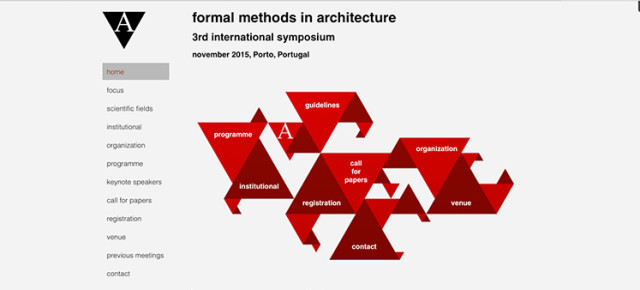Formal Methods in Architecture
The main purpose of this symposium is a contribution to the debate about the application, in the disciplines of Architecture and Urbanism, of new formal methods – new methodological advances based on new developments coming from Mathematics.
From the millennial geometry to current shape grammars, several formal approaches to Architecture and Urbanism will be presented, with their different points of view, different fields of application, different grades of abstraction and formalization. The aim is to look at the potentials and objectives of these formal methods, both those on the horizon as well as those already accomplished, their successes but also their problems. The intention is to promote the use of formal methods in the creation of new explicit languages for problem-solving in Architecture. These problems range from representation, to theory, critique, production, communication, etc., never ceasing to see Architecture and Urbanism as technological activities and well as artistic ones.
The more historically established areas of application of mathematical sciences, such as traditional geometries or mathematical developments connected to engineering, are left somewhat outside the focus, without however forgetting the deep connections these establish with the new formal methods. Many of these have a level of development that requires the existence of established academic communities, with their own specialized forums. These symposia, more than an attempt to deepen each specific field, are above all about finding points of convergence.
This is not limited to a possibly interesting abstract integration of different areas of research, but mainly to advance the multiple crossings between several methods, which fertility has already been proven.
A dialogue with semi-formal and even informal methods in current use is to be stimulated as well, as a way to deepen the discussion on aesthetics and ideologies controversies that surround the possibilities and reach of a formalization of Architecture and Art.
As in previous symposia, some contributions will be made on the application of formal methods on fields other than architecture, like literature, music, and the fine arts, in as much as they may be useful for architectural application.
This symposium is addressed to:
Architects
Architectural students
Urban Planners
Civil engineers
The complementary courses, which have an autonomous organization, are directed to an international body of professionals who intend to familiarize themselves with specific digital tools for these formal methods.



Comments :